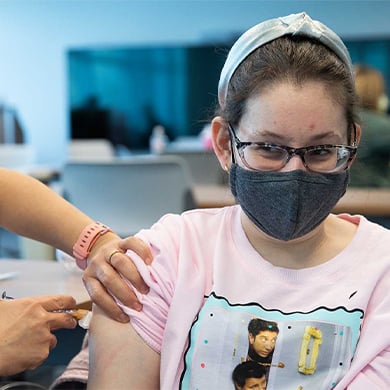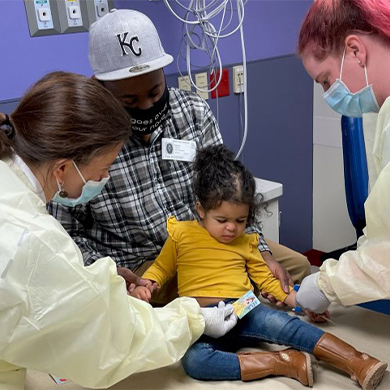Elin Grundberg, PhD
Roberta D. Harding & William F. Bradley, Jr. Endowed Chair in Genomic Research; Professor of Pediatrics, University of Missouri-Kansas City School of Medicine; Research Associate Professor of Pathology, University of Kansas School of Medicine
Full BiographyThe population of immune cells in the nasal membrane decreases dramatically with age, likely contributing to the differences seen in the severity of respiratory diseases like SARS-CoV-2 infection, according to a recent study by the Children’s Mercy Research Institute (CMRI) investigators.
In their study, lead investigator Elin Grundberg, PhD, of the Genomic Medicine Center at the CMRI, and her colleagues offered the first-of-its-kind single-cell atlas that shows the complete cellular landscape of uninfected human nasal samples over a person’s lifespan. The results of the study, published in 2021 in the journal Scientific Reports, offers a potential strategy for future studies on treating respiratory infections.
Dr. Grundberg’s CMRI co-authors on the study were Tomi Pastinen, MD, PhD, Warren A. Cheung, PhD, Boryana Koseva, PhD, Todd Bradley, PhD, and Konner Winkley from the Genomic Medicine Center; and Rangaraj Selvarangan, PhD, and Dithi Banerjee, PhD, MSc from the Department of Pathology and Laboratory Medicine.
Previous studies have pointed to the possibility that, after infection with SARS-CoV-2, those who are younger mount a more robust immune response in the nasal mucosa – the membranes that line the nasal cavity – than those who are older.
“However, it remained unclear whether this age-related disparity could be attributed to increased immune activation or whether the population of immune cells, or what we call ‘immune residence,’ was actually the key factor,” says Dr. Grundberg.
To answer the question, Dr. Grundberg and her colleagues applied single-cell RNA sequencing and measured the composition of the cells as well as the transcriptional profile of the nasal mucosa. The investigators conducted the study in 35 children and adults who ranged in age from 4 months to 65 years old and who were not infected with SARS-CoV-2, the virus that causes the infectious disease COVID-19.
After analyzing about 30,000 immune and epithelial cells, the investigators found that the proportion of immune residency and age are inversely proportional, meaning the population of immune cells inside the nose was found to have decreased as a person’s age increased. There was little evidence that the structure of the cells themselves changed over time.
We were intrigued by our finding of this clear age association in immune cell residency achieved by applying single-cell technologies on sparse material obtained from nasal swabs,” says Dr. Grundberg. “This high-resolution cellular investigation also allowed us to narrow it down to a specific immune cell population (CD8+ T cells) that were pronounced in children and express genes with known antiviral functions. Shortly after our report, there was another report from leading investigators in the field validating the signature we observed, which is always reassuring.
Dr. Grundberg added that their ongoing research efforts include large-scale epigenome investigations using similar nasal mucosal samples from COVID-19 positive children and adults. In these studies Dr. Grundberg and her colleagues aim to understand population variability in disease outcome and the role of age, sex/gender, race, ethnicity and viral strains.
Dr. Grundberg holds the Roberta D. Harding & William F. Bradley Jr. Endowed Chair in Genomic Research at the CMRI. She is also an Associate Professor of Pediatrics at the University of Missouri-Kansas City School of Medicine.
Dr. Grundberg’s CMRI co-authors on the study were Tomi Pastinen, MD, PhD, Warren A. Cheung, PhD, Boryana Koseva, PhD, Todd Bradley, PhD, and Konner Winkley from the Genomic Medicine Center; and Rangaraj Selvarangan, PhD, and Dithi Banerjee, PhD, MSc from the Department of Pathology and Laboratory Medicine.



